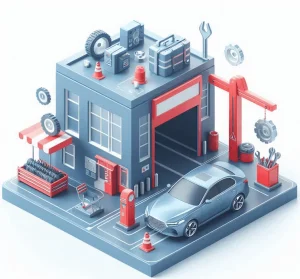Table of Contents
self driving cars The world of transportation is undergoing a seismic shift, thanks to the advent of self driving cars. Among the automotive giants leading this revolution is Ford, a company renowned for its innovation and forward-thinking approach. Ford’s commitment to developing autonomous vehicles is not just about staying competitive; it’s about transforming the way we live, work, and travel. This article delves into how Ford self driving cars are changing the game, exploring the technology, benefits, and future implications of this groundbreaking advancement.

The Technological Backbone of Ford Self Driving Cars
Advanced Sensor Fusion
At the heart of Ford’s self driving cars lies an intricate network of sensors, cameras, LIDAR, and radar systems. These devices work in concert to create a detailed, real-time 3D map of the vehicle’s surroundings. The sensor fusion technology integrates data from multiple sources, providing a comprehensive view that allows the vehicle to detect and respond to various obstacles and scenarios with remarkable precision.
Artificial Intelligence and Machine Learning
Ford employs sophisticated artificial intelligence (AI) and machine learning algorithms to power its autonomous driving systems. These algorithms process vast amounts of data to make real-time decisions, ensuring safe and efficient navigation. Over time, the AI learns from countless driving scenarios, continually improving its performance and adaptability.
High-Definition Mapping
Accurate and up-to-date maps are crucial for the successful operation of self driving cars. Ford uses high-definition mapping technology to provide its vehicles with precise information about the road ahead, including lane markings, traffic signals, and potential hazards. This technology enables the car to navigate complex environments with ease.
Enhancing Safety and Reducing Accidents
One of the most significant benefits of self driving cars is their potential to enhance road safety. Human error is a leading cause of traffic accidents, and autonomous vehicles can mitigate this risk through their advanced sensing and decision-making capabilities.
Predictive Analytics
Ford’s self driving cars utilize predictive analytics to anticipate and react to potential dangers. By analyzing data from sensors and historical driving patterns, the vehicle can predict the behavior of other road users and take preemptive actions to avoid collisions. This proactive approach significantly reduces the likelihood of accidents.
Redundancy and Fail-Safe Mechanisms
Safety is paramount in the design of Ford’s autonomous vehicles. The company incorporates multiple layers of redundancy and fail-safe mechanisms to ensure continuous operation even if one system fails. For example, if a primary sensor malfunctions, backup sensors can take over, maintaining the vehicle’s awareness and control.
Enhanced Driver Assistance Systems
While fully autonomous vehicles are the ultimate goal, Ford has also integrated advanced driver assistance systems (ADAS) into its current lineup. These systems, such as adaptive cruise control, lane-keeping assist, and automatic emergency braking, provide incremental safety benefits by assisting drivers in various situations. They serve as a bridge to full autonomy, enhancing safety today while paving the way for the future.
Transforming Urban Mobility
Ford’s self driving cars have the potential to transform urban mobility, addressing some of the most pressing challenges faced by modern cities. Traffic congestion, pollution, and limited parking are just a few of the issues that autonomous vehicles can help alleviate.
Efficient Traffic Management
Autonomous vehicles can communicate with each other and with traffic management systems to optimize traffic flow. By coordinating movements and reducing stop-and-go driving, self driving cars can decrease congestion and improve overall traffic efficiency. This leads to shorter commute times and a smoother driving experience for everyone.
Reduced Emissions
Electric and hybrid self driving cars contribute to reduced emissions, making urban environments cleaner and healthier. Ford is committed to sustainability, and its autonomous vehicle program includes a focus on developing eco-friendly solutions. By integrating electric drivetrains with autonomous technology, Ford aims to create a greener future for urban transportation.
Smart Parking Solutions
Finding parking in crowded cities can be a frustrating and time-consuming task. Ford’s self driving cars can revolutionize this aspect of urban living by providing smart parking solutions. Autonomous vehicles can drop passengers off at their destination and then park themselves in designated areas. This not only saves time for users but also optimizes the use of available parking space, reducing the need for expansive parking lots.
Economic and Social Impacts
The widespread adoption of self driving cars is poised to bring significant economic and social changes. Ford is at the forefront of this transformation, leveraging its autonomous vehicle technology to create new opportunities and address societal challenges.
Job Creation and Transformation
While there are concerns about the impact of autonomous vehicles on traditional driving jobs, the rise of self driving cars will also create new employment opportunities. Ford is investing in the development of new skills and training programs to prepare the workforce for jobs in areas such as vehicle maintenance, data analysis, and AI development. The shift towards autonomous vehicles will lead to a transformation of the job market, with a focus on high-tech and service-oriented roles.
Improved Accessibility
Self-driving cars have the potential to improve accessibility for individuals who are unable to drive, such as the elderly and disabled. Ford’s autonomous vehicles can provide on-demand transportation, offering greater independence and mobility to these populations. This increased accessibility can enhance quality of life and create more inclusive communities.
Economic Efficiency
Autonomous vehicles can drive economic efficiency by reducing the costs associated with accidents, traffic congestion, and inefficient transportation. Ford’s self-driving cars can lower operational costs for businesses by enabling more efficient logistics and delivery services. This, in turn, can lead to lower prices for consumers and a more competitive economy.
Ford’s Strategic Partnerships and Collaborations
Ford recognizes that achieving the full potential of self-driving cars requires collaboration with technology companies, governments, and other stakeholders. The company has established strategic partnerships to accelerate the development and deployment of autonomous vehicles.
Argo AI Collaboration
One of Ford’s key partnerships is with Argo AI, a leading autonomous vehicle technology company. This collaboration combines Ford’s expertise in vehicle manufacturing with Argo AI’s advanced self-driving technology. Together, they are working to develop a robust and scalable autonomous driving system that can be integrated into Ford’s vehicles.
Government and Regulatory Engagement
Ford actively engages with governments and regulatory bodies to shape the policies and standards for autonomous vehicles. The company advocates for safety, innovation, and consumer protection, ensuring that the regulatory framework supports the responsible deployment of self-driving cars. This collaboration is crucial for building public trust and acceptance of autonomous technology.
Industry Alliances
Ford is also a member of various industry alliances that promote the development and adoption of autonomous vehicles. These alliances provide a platform for sharing knowledge, best practices, and technological advancements. By working together, industry players can overcome common challenges and accelerate the path to fully autonomous driving.
The User Experience: Convenience and Comfort
Ford’s self-driving cars are designed with the user experience in mind, offering unparalleled convenience and comfort. The transition to autonomous vehicles is not just about technology; it’s about enhancing the way people live and travel.
Personalized Mobility Solutions
Ford’s autonomous vehicles offer personalized mobility solutions tailored to individual needs. Using advanced algorithms and connectivity, the self-driving car can learn user preferences, such as preferred routes, climate settings, and entertainment options. This level of personalization ensures a comfortable and enjoyable journey every time.
Seamless Connectivity
Connectivity is a cornerstone of the self-driving car experience. Ford’s autonomous vehicles are equipped with state-of-the-art infotainment systems that provide seamless integration with smartphones, smart home devices, and other connected services. Passengers can stay connected, entertained, and productive while on the move.
Redefining In-Car Time
With the vehicle taking over driving responsibilities, passengers can make better use of their in-car time. Whether it’s catching up on work, enjoying multimedia entertainment, or simply relaxing, the self-driving car transforms travel time into valuable personal time. Ford’s autonomous vehicles are designed to create a serene and enjoyable environment, with features such as adjustable seating, ambient lighting, and premium audio systems.
Looking Ahead: The Future of Ford Self Driving Cars
The journey towards fully autonomous vehicles is an ongoing process, with continuous advancements and innovations on the horizon. Ford’s commitment to self-driving cars is unwavering, and the company is poised to lead the charge into a new era of transportation.
Continuous Innovation
Ford’s investment in research and development ensures that its autonomous vehicles remain at the cutting edge of technology. The company is continually exploring new advancements in AI, sensor technology, and vehicle connectivity. This dedication to innovation guarantees that Ford’s self-driving cars will continue to evolve and improve.
Expanding Autonomous Services
Ford is expanding its autonomous vehicle services to include ride-sharing, delivery, and other mobility solutions. By leveraging its self-driving car technology, Ford aims to create a comprehensive ecosystem that addresses a wide range of transportation needs. This expansion will provide greater flexibility and convenience for users, further integrating autonomous vehicles into daily life.
Building Public Trust
Public trust is essential for the widespread adoption of self driving cars. Ford is committed to transparency and education, providing clear information about the benefits and capabilities of its autonomous vehicles. By demonstrating the safety, reliability, and convenience of self driving cars, Ford aims to build confidence and acceptance among consumers.
Self driving cars
Ford’s self driving cars are more than just a technological marvel; they represent a fundamental shift in the way we think about transportation. By combining advanced technology with a user-centric approach, Ford is changing the game and paving the way for a future where autonomous vehicles are an integral part of our lives.
From enhancing safety and efficiency to transforming urban mobility and creating economic opportunities, the impact of self driving cars is profound. Ford’s dedication to innovation, strategic partnerships, and consumer experience positions the company as a leader in this exciting new era.
As we look ahead, the promise of Ford self driving cars is not just about getting from point A to point B; it’s about redefining the journey itself. With Ford at the helm, the future of transportation is bright, and the road ahead is full of possibilities.






More Stories
The Best Autonomous Cars of the Year
Volvo Self Driving Cars: When Safety Meets Autonomy
Beyond the Wheel: Exploring Ford Autonomous Vehicle Revolution